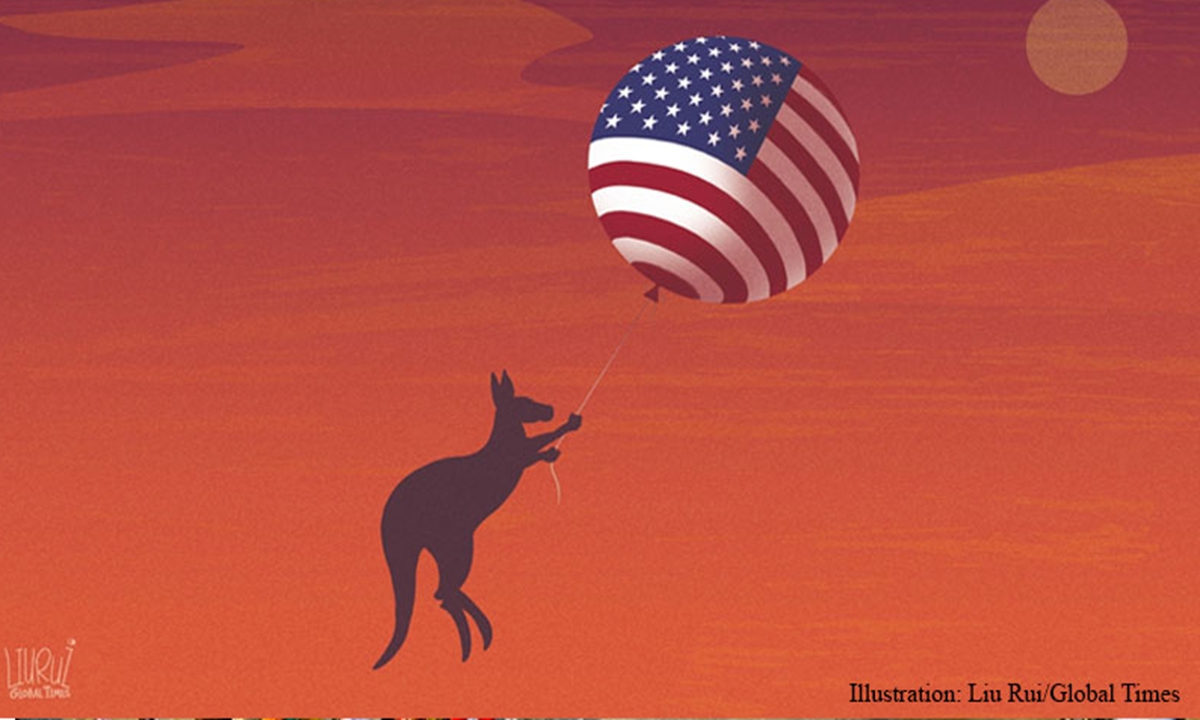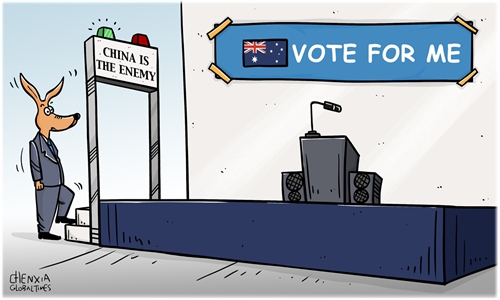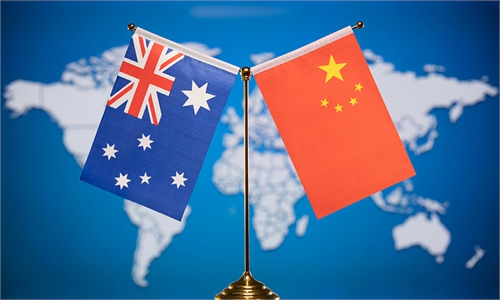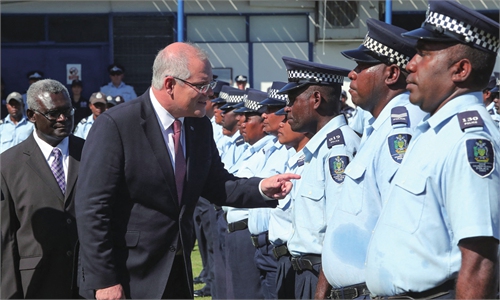Australia’s absolute loyalty to the US and its anti-China yellow peril behind the deterioration of bilateral ties: Chinese experts

Illustration: Liu Rui/GT
Editor's Note:The China-Australia relationship has deteriorated sharply in recent years as a consequence of Australia's unhinged and hysterical foreign policy. As the 2022 Australian federal elections approach, how will the elections impact the bilateral relationship? Is there any chance for improvement in bilateral ties? And what lessons can we learn from these worsening relations? The Global Times (GT) interviewed Yu Lei (Yu), chief research fellow at the Research Center for Pacific Island Countries of Liaocheng University, and Wang Chuanjun (Wang), a Chinese correspondent for Guangming Daily in Australia from 2018 to 2020, over these issues.
GT: Why has Australia's relationship with China sharply deteriorated from what was previously a normal and healthy track?
Yu:From a strategic perspective, Australia is a guardian of the hegemonic system headed by the US, which increasingly perceives China's development as a threat. Preventing the rise of an emerging superpower capable of challenging American hegemony, especially in the Asia-Pacific region, has become a strategic consensus of the US and its allies. The US was extremely dissatisfied with the development of China-Australia relations, especially the development of the China-Australia comprehensive strategic partnership.
Since the Obama administration, the US has kept pressuring Australia when it comes to its relations with China. US pressure is the most important external factor vis-à-vis the deterioration of China-Australia relations.
From the perspective of Australia's domestic politics, major political parties in Australia have long-term close ties with the US. If leaders of any political party are not recognized or supported by the US, it will be difficult for them to get promoted in the party, let alone be elected as prime minister; even if they can assume power as prime minister, they can hardly stabilize their power and position without US support.
Economically, Australia's economy is highly dependent on China. Such high dependence has made the country's political, military and academic circles worry about Australia's economic security. Emerging calls within Australia for reducing the economic independence on China and diversifying economic partners are the reasons for a downward trend in bilateral economic and trade cooperation.
Wang: First, Australia is an ally of the US and a member of the Five Eyes alliance that has the closest intelligence exchanges and cooperation with Washington. In terms of foreign policy, Australia follows America's lead, and when it comes to the issue of containing China, the Australian government has even jumped higher than the US in order to curry favor with Washington. Australia's suppression of Huawei and introduction of the Foreign Influence Transparency Scheme stand as obvious examples.
Second, opposition to China has become political correctness under Australia's domestic political ecology. Australian security and intelligence agencies, controlled or influenced by the US, have played an important role in exacerbating the deterioration of China-Australia relations. In particular, they often make an issue of the so-called Chinese spies or the alleged China's infiltration to mislead the public, especially the Australian public. It's fair to say that since 2018, almost all the Australian media have overwhelmingly engaged in hyping up the so-called China threat, China's "infiltration" and "interference." This has led to politicians playing the anti-China card to win votes. After Scott Morrison won a surprise reelection in 2019, he has viewed "acting tough on China" as a trump card to gain support and to further his political career.
GT: Many countries are facing a situation where they rely on China for their economy and on US for their security, but they are ultimately able to maintain a balance. Why can't Australia do this?
Yu: There are both external and internal reasons. The external factor is the pressure from the US. Australia is one of the important fulcrums of the US' Indo-Pacific Strategy, so is Japan. Therefore, it's difficult for the two countries to strike a balance between the US and China as the US doesn't allow them to do so. Internally, Australian political parties and politicians must strive to gain recognition and support from the US if they want to reach the pinnacle of Australian politics. "Acting tough on China" is a shortcut for them to gain political support from the US.
What's more, Australia believes that the rise of China has changed the power structure in the Asia-Pacific region, and its sub-hegemony in the Pacific Island region, which is viewed by Australia as backyard, and in the Southeast Asia, which Australia considers as foreyard, is threatened by China's rise.
Wang: For one thing, Australia's 20 years of continuous economic growth and his surprise reelection in 2019 have made Morrison and his government arrogant. They believe Australia has long been a major power, and must display its influence. For another, Australia tends to believe that its iron ore is indispensable and irreplaceable to China's economic development, and that Australia won't receive heavy counterattacks from China due to the significance of its iron ore, even if it takes unbridled actions against China.
GT:This year marks the 50th anniversary of the establishment of China-Australia diplomatic ties. In an opinion piece for The Australian Financial Review, Chinese Ambassador to Australia Xiao Qian said China and Australia are important countries in the Asia-Pacific region and the bilateral relations have important impact on both countries and the wider region. He said, "To ensure the healthy and stable development of the China-Australia relationship, it is of vital importance to properly handle our differences while expanding consensus and strengthening co-operation." In your opinion, can the new Australian government understand and will it respond to this suggestion after the elections?
Wang:If Morison is reelected, it's estimated that he will not heed this advice. Rather, he will take more measures that will cause harm to the relationship between the two countries, which will drive a further deterioration in bilateral relations. But if Labor leader Anthony Albanese assumes office, he may consider this suggestion to some extent. There will be a possibility or opportunity for China-Australia relations to turn around, but we shouldn't expect too much.
GT: When and under what conditions can the China-Australia relationship return to a normal and healthy track?
Yu: Before the rise of China's economy in the 1990s, Australia's economic development stagnated and unemployment rose sharply because there were not enough markets for Australia's minerals. Then Singapore prime minister Lee Kuan Yew warned Australia was risking becoming the "poor white trash of Asia" as no one could consume its resources. But Lee failed to foresee that China's industrialization could have become so rapid that it not only consumed Australia's mining resources, but also others' globally. But perhaps losing access to China's market will make Lee's warning come true. Only when Australia is in serious trouble can it reflect on itself and realize where its true national interests lie.
Wang: Even if Morrison suffers a defeat, the China-Australia relationship cannot return to a normal track in the short term. Only when Australia's domestic public opinion and the hostile atmosphere toward China change, and being anti-China is no longer politically correct, can there be a possibility of improvement in China-Australia relations.
GT: What are the hidden dangers that the existence of AUKUS will bring to China-Australia relationship? In which areas and fields will Australia still stick to the wrong path in its ties with China?
Yu: The AUKUS deal will bring about the risks of nuclear proliferation, completely undermine the implementation of The South Pacific Nuclear Free Zone (SPNFZ) Treaty, trigger a regional arms race and damage regional peace and stability. The international community and regional countries should call for the international nuclear nonproliferation regime based on the Treaty on the Non-Proliferation of Nuclear Weapons to be upheld and the establishment of a nuclear-free zone in the South Pacific. After WWII, countries such as the US, UK and France conducted more than 100 nuclear tests in the South Pacific region, posing a grave threat to the ecosystem of the region and the safety of the people living there.
Wang: The AUKUS deal will only further complicate the situation in the South Pacific region and tie Australia more tightly to the US' anti-China chariot. In the future, Australia will continue to make an issue out of the growing security cooperation between China and the Pacific island nations, because Canberra always believes these small island countries are its sphere of influence and should be obedient to it.
GT: What lessons do you think can we learn from the deteriorating China-Australia ties?
Wang: In view of the differences in political systems and ideologies between China and Australia, as well as the fact that Australia is a staunch ally of the US and that it has always closely followed the US' lead in history, Australia will ultimately lean to the US at critical moments. We must pay close attention to any changes in Australia's policy toward China and avoid misjudgment.



